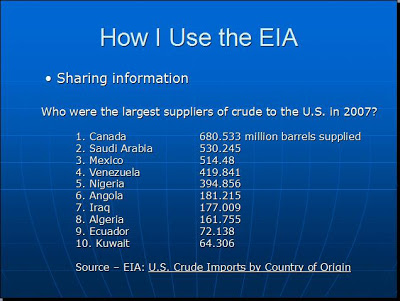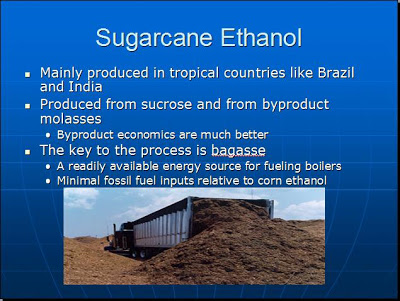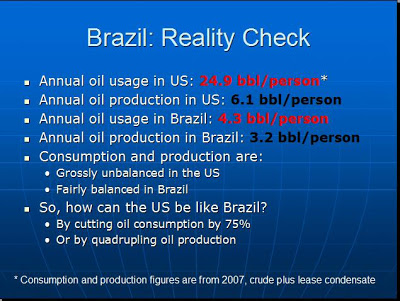I just learned today that the two presentations I made at this year’s ASPO conference are now available. The slides are pretty self-explanatory, but they only served as background for the talk so people could read through them as I made my points. I intend to write up my notes and post them as time allows.
First up, the slides I presented on the energy information agencies:
The Energy Information Providers
Here is a sample slide from that presentation:
Second was my presentation on biofuels:
A couple of sample slides from that presentation:
If they make the video available, I will post that link as well.



In your slides you left out several potential biofuels currently being worked on. Sapphire for example claims to have biocrude a bonafide substitue for petroleum. I’m not exactly sure what Amyris is working on, but it almost certainly includes some kind of terpene. This spring I heard a talk from someone who should know who said that Amyris was developing geranyl acetate as a jet fuel. It was only mentioned briefly so I’m not sure if I heard right or if it even makes sense.
In any case, I am curious to hear your opinion on some of these more unusual forms of biofuels.
I need to write up what I actually said and post it. On that slide with potential biofuels, I said “I could have put up half a dozen slides on this, but here is a sampling.”
RR
Thanks for a great resource. What would be good to add (or do you have a good URL?) would be estimated current, and perhaps projected, unit costs (if available and meaningful), as they relate to fossil fuels.
Current prices? This Week in Petroleum was already mentioned as a source in particular, and the EIA in general
http://tonto.eia.doe.gov/oog/info/twip/twip.asp
http://www.eia.doe.gov/cneaf/coal/page/coalnews/coalmar.html
I usually look at Bloomberg for oil and natural gas spot prices, though I wonder what percentage of energy products are bought at the spot prices.
http://www.bloomberg.com/energy/
clee,
No what I meant was unit costs for alternative energy sources, like wind and solar. I do use Bloomberg and the EIA for oil and gas (Bloomberg is bookmarked on my BlackBerry).
Oh, alternate energy sources. For renewable energy I’ve been using the Renewable Energy Global Status Report, Table 1. The latest version of the report at
http://www.ren21.net/pdf/RE2007_Global_Status_Report.pdf
For comparison of electricity generation costs, (capital, operation and maintenance, fuel, life cycle/kwh, etc), I’ve been looking at the IEA report on Projected Costs of Generating Electricity, though it’s a few years old now.
http://www.iea.org/Textbase/publications/free_new_Desc.asp?PUBS_ID=1472
I don’t know whether to trust the EIA’s projections which don’t seem to give life cycle cost per kWh.
If RR’s idea of contender is ‘renewable energy other’ powering PHEV.
There is an interesting trait of doomers. Unlike the EIA, predictions of EIA, the doomers are always wrong. The human race will do just fine.
All the electricity we need can be provided by wood, coal, and nuclear with insignificance environmental impact. Transportation is a little harder. Rationing, car pooling and direct gasification worked during WWII.
Thanks clee! Good resource. Interesting that the US produced more ethanol than Brazil in 2007. I guess that says something about the realities of scale that wide eyed politicians fail to grasp.
Good presentation RR. I wish you could make it to one of our EVPs who has fallen in love with algae. (I was once romanced too, but after more research I think it is a dead end.)
The more I think about it, the more I support what is now called an “open fuel standard”. Make cars that can run on conventional gasoline, ethanol, and methanol. And diesel engines that can run on either conventional or biodiesel and DME. If there are any subsidies, it should go with the fuel with no regard for how it is made. If you are worried about CO2 then tax it as a seperate issue.
“If there are any subsidies, it should go with the fuel with no regard for how it is made.”
Just a question — can anyone name a significant technology that was developed in response to mass-market subsidies?
There are certainly a number of technologies whose development was accelerated by military demand(oil-fueled ships, aircraft, computers) — but the military paid full price. The technology later spread into the broad market on the basis of faster, better, cheaper.
Problem with broad subsidies is that they seem to end up as non-sustainable pay-offs to the politically well-connected, without actually creating a genuinely viable technology.
Good stuff, RR!
Just a question about this line (no reference given) on slide #23: ““Investors in ‘fuelInvestors fuel-from from-algae’ scheme left high and dry dry” – 6/8/2007
Does the comment relate to GreenFuel Technologies? It implies that it is. If not, you could get yourself in trouble over that one.
Kine-
The Internet. Heavily subsidized in early years, through DARPA.
All sorts of argricultural breakthroughs started out in government-subsidized research labs at great ag schools.
NASA spin-offs are legion.
In general, though, I concur: Only basic research should be subsidized.
On other matters, I think the price mechanism can be used to mimic costs the private sector misses. The national security and environmental costs of private behavior.
Does anyone have the “right” to pollute the air you breath? Interesting question.
How about fouling the water so you cannot swim or fish?
How about aiding and abetting enemies of the United States? Do people have the right to do that?
Halliburton was big on selling technology to Iran. Jeez. Now, we send hundreds of billions to Mideast terror sponsors.
Seems to me we should use the price mechanism and some subsidies to get Volt-type EVs rolling, and bigtime.
Hey $1 trillion to set up a Shia strongman in Iraq, and $1 trillion for Wall Street, how about some chump change for guys who make non-polluting fuel-efficient cars?
Maybe it doesn’t matter.
Oil dumping hard, hard,hard today. I think the price spike last month was some sort of bailout for the hedge funds who had gone long oil.
Now?
See you at $60 a barrel.
Kin – you are right, there are many more examples of how subsidies turn into handouts rather than handups to emerging industries. The ethanol boondoggle is going on 30 years.
Congress shouldn’t be picking winners and losers. If I start with corn and ferment and distil it into alcohol, I get the tax credit. If I grind up the whole corn plant; ears, stocks, roots, and all; shove it into a gasifier then make ethanol from the syngas – I get nothing! In selecting fermentation and distillation, congress is telling us that they know best how to make ethanol.
OT, but–
I wonder if we are going to see a full-on oil glut in the next two years.
Between 1979 and 1983, US oil demand fell from a peak of 21 mbd to a low of 14 mbd, annual rate, measured on monthly basis.
Now, we are facing higher prices and a dead economy again. Supplies are healthy. Biofuels booming.
New fuel efficient cars coming out.
See you at $60, unless I see you at $40, or maybe $20.
Subsidies? Let’s stop subsidizing rural roadways and electrification. The whole state of Alaska is one big handout. The $350 million bridge to a small island is just one example.
The biggest welfare queens in America are farmers.
OT again, but whoosh Buffet goes into EVs. That means Chrysler, GM, Nissan Toyota….
Widespread use of EVs means that power will come from our grid, not oilfields
…short oil?
Buffett Buys Stake in Chinese Battery Manufacturer
By KEITH BRADSHER
Published: September 29, 2008
HONG KONG — The billionaire investor, Warren E. Buffett, announced Monday that he had agreed to buy a 9.89 percent stake in a Chinese battery manufacturer that plans to sell electric cars in the United States by 2010.
The MidAmerican Energy Holdings Company, will pay 1.8 billion Hong Kong dollars — about $230 million — for the stake in the battery maker, the BYD Company. Mr. Buffett’s Berkshire Hathaway owns 87.4 percent of MidAmerican.
Based in Shenzhen, a mainland Chinese city adjacent to Hong Kong, BYD is one of the world’s largest makers of rechargeable batteries for cellphones and other uses. The company also has a fast-growing auto manufacturing subsidiary that accounts for nearly a third of its revenue and makes fuel-efficient compact and subcompact cars for the Chinese market.
The president of BYD, Wang Chuanfu, said that the alliance with Mr. Buffett was not just about raising capital for the manufacturer, which relies heavily on short-term debt.
Nice charts. I’m spending alot of time searching for info to get an informed opinion on biofuels etc. What do you find as a good source for this info.
For example, I hear that concrete production is a big factor in creating Co2. Where would I find info about % and how that data is determined.
Benny Cole wrote: “NASA spin-offs are legion.”
True — but NASA did not subsidize teflon-lined frying pans until they could compete with traditional frying pans. Instead, smart people saw an opportunity in NASA's research — and teflon-lined frying pans won the market by providing something for which consumers were prepared to pay the full cost & more.
Same with the Internet — consumers were happy to pay the full cost without subsidies.
I don't know of any technology which was subsidized into mass-market success. What the political class is trying to do with alternate fuels is unprecedented — which means there is a high risk of failure. In fact, we can already point to earlier such political failures (e.g. solar heating in California in the 1980s).
It would be much better for the political class to subsidize fundamental research and remove regulatory impediments to innovation.
In fact, we can already point to earlier such political failures (e.g. solar heating in California in the 1980s).
Or…(cough) highly relevant (cough)… EVs in CA as recent as the early 2000s.
It would be much better for the political class to subsidize fundamental research and remove regulatory impediments to innovation.
Oh, come on, King!
Who is going to pay all those outrageous Ag subsidies under such a sensible scheme? Honestly! You obviously don’t care about the fate of the American farmer (read: Big Ag fat cats)!